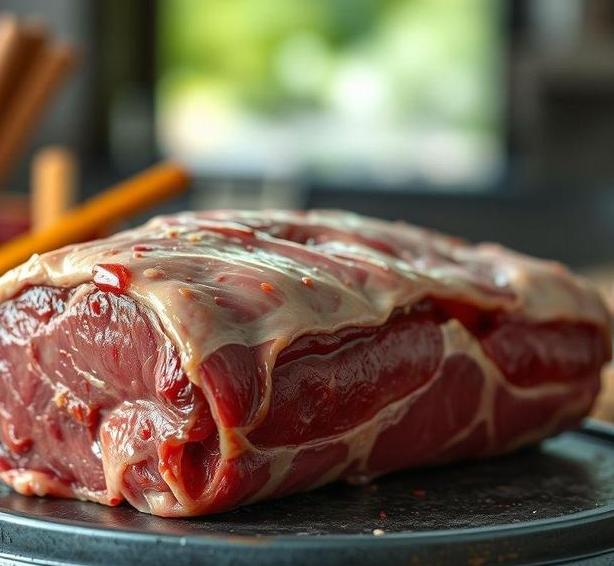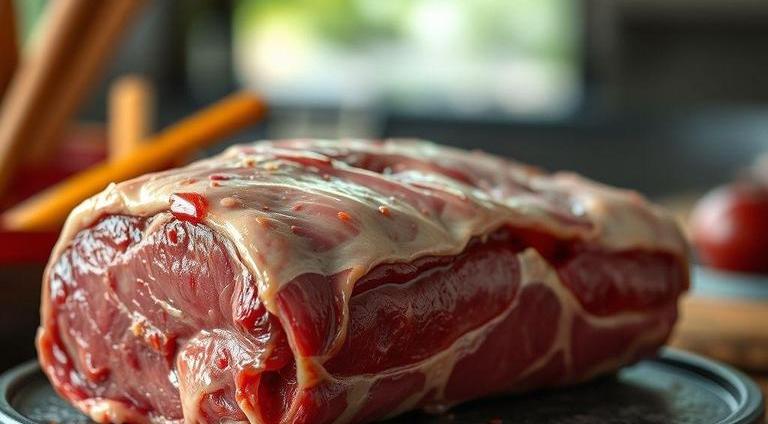Handling uncooked meat requires attention to detail, as it can easily go bad if not stored or handled properly. Knowing how to spot the signs of spoilage and understanding the shelf life of uncooked meat can help you keep your food safe and your meals delicious. Whether you’re a home cook or someone who just enjoys grilling on the weekend, having the right knowledge can make all the difference.
Meat is a nutrient-rich food, but it’s also highly perishable. It’s packed with proteins, fats, and other essential nutrients, which, unfortunately, create an environment where bacteria and other microorganisms can thrive. The real challenge is knowing exactly when uncooked meat is still safe to eat and when it’s time to toss it out. Let’s dive into the details.
Can Uncooked Meat Go Bad?
Yes, uncooked meat can absolutely go bad. In fact, it’s one of the most perishable foods you can buy. The primary factors contributing to spoilage are bacteria, temperature, and time. When uncooked meat is exposed to the wrong conditions-like warm temperatures or improper storage-it can spoil quickly, potentially leading to foodborne illness. Even if it looks fine on the outside, harmful bacteria like Salmonella, E. coli, and Listeria can grow inside, causing serious health risks.
Here’s a breakdown of the key factors that make uncooked meat go bad:
- Bacterial Growth: Meat is a perfect breeding ground for bacteria, especially when left at room temperature for too long. These bacteria can multiply rapidly, causing spoilage.
- Temperature: Keeping uncooked meat at an ideal temperature (refrigerated or frozen) slows down bacterial growth. Anything above 40°F (4°C) is in the “danger zone” for bacterial growth.
- Moisture Content: Meat has a high moisture content, which is great for bacteria to thrive. Once it starts to dry out, it’s usually a sign of spoilage, although drying doesn’t eliminate bacterial risks.
Shelf Life For Uncooked Meat

Knowing the shelf life of uncooked meat is essential to ensuring its safety and quality. The shelf life varies depending on the type of meat, its cut, and how it’s stored. Here’s a general guideline for various types of uncooked meat:
Poultry (Chicken, Turkey, Etc.)
- Refrigerated: 1-2 days
- Frozen: 9-12 months
Beef, Pork, Lamb (Steaks, Roasts, Chops)
- Refrigerated: 3-5 days
- Frozen: 4-12 months (depending on the cut)
Ground Meat (Beef, Pork, Turkey, Etc.)
- Refrigerated: 1-2 days
- Frozen: 3-4 months
Fish And Seafood
- Refrigerated: 1-2 days
- Frozen: 3-6 months
Bacon Or Sausages
- Refrigerated: 7 days (for raw sausages); 1 week for bacon
- Frozen: 1-2 months
It’s important to note that these are just general guidelines. The actual shelf life can be shorter or longer depending on how the meat is stored and how fresh it was when you bought it.
Common Signs Of Spoilage
Even with a general understanding of shelf life, sometimes it’s not easy to tell when meat has gone bad. Here are some common signs to look out for:
Off Smell
- Fresh meat has a mild, slightly metallic scent. As it spoils, it will emit a strong, unpleasant odor-often described as sour or rancid. If the meat smells “off”, it’s likely spoiled and should be discarded.
Discoloration
- Meat naturally changes color as it ages. Beef might turn from red to brown, while chicken can go from pink to gray. However, any greenish, bluish, or otherwise strange color could indicate spoilage. Even darkening (like a dark brown or purplish hue) could signal that bacteria have begun to break down the meat.
Slimy Or Sticky Texture
- Meat that has a slimy or sticky texture is typically a sign that it’s starting to spoil. This happens when bacteria break down the proteins, leading to a sticky film. Fresh meat should be moist but not tacky or slippery.
Unusual Texture
- When meat starts to spoil, it can become mushy or excessively dry. For example, ground beef can become crumbly or fall apart, while steaks and chops may lose their firmness.
Expiration Date
- While not foolproof, the “use by” or “sell by” date is a good first line of defense. If you’ve passed that date, even if the meat looks and smells okay, there’s a higher chance it’s unsafe to eat.
How To Store Uncooked Meat?

Proper storage is the key to preserving the freshness and safety of uncooked meat. Whether you plan to cook it within a few days or freeze it for future use, here’s how to do it:
Refrigeration
- Temperature: Keep your fridge at 40°F (4°C) or lower.
- Packaging: If you bought meat in a vacuum-sealed package, it’s usually safe for 1-2 days beyond the “sell by” date. For other meat, like steaks or chops, rewrap it in plastic wrap or wax paper to prevent exposure to air, which can cause the meat to dry out.
- Placement in Fridge: Store meat on the lowest shelf to avoid any juices dripping onto other foods.
Freezing
- Wrap Properly: For long-term storage, wrap uncooked meat tightly in plastic wrap, aluminum foil, or freezer paper. You can also use a vacuum-sealed bag to prevent freezer burn.
- Labeling: Don’t forget to label the packages with the date so you can track how long they’ve been in the freezer.
- Freezing Time: Avoid keeping meat in the freezer for too long. While it can last several months, its texture and taste might degrade over time.
Thawing Meat
- Fridge Method: The safest way to thaw meat is in the refrigerator, as it keeps the meat at a constant, safe temperature.
- Cold Water Method: If you’re short on time, you can submerge the meat in cold water (in a sealed bag) for a few hours. Never thaw meat at room temperature.
Expert Tips
Here are some expert tips that will help you handle uncooked meat more safely:
- Buy Fresh: When purchasing meat, try to pick the freshest possible cuts and avoid those with any bruising, discoloration, or unpleasant smells.
- Keep Meat Separate: To avoid cross-contamination, always store raw meat separately from ready-to-eat foods like vegetables, fruits, and cooked meats.
- Cook Quickly After Purchase: If you’re planning on using meat within a day or two, try to use it right away. Fresh cuts of meat lose quality quickly, even when stored properly.
- Practice FIFO (First In, First Out): Organize your fridge or freezer so that older packages are used first. This ensures that meat doesn’t sit around for too long, increasing the risk of spoilage.
- Keep Meat in Its Original Packaging: If possible, avoid opening the packaging until you’re ready to cook. The vacuum-sealed packaging is designed to preserve freshness.
FAQs
Can Uncooked Meat Go Bad In The Fridge?
Yes, uncooked meat can go bad in the fridge if it is not stored properly or if it is kept for too long. Typically, raw meat should be cooked or frozen within 1-2 days for optimal freshness and safety.
How Long Can Uncooked Meat Last In The Fridge?
The storage time for uncooked meat in the fridge varies based on the type of meat. Ground meat and poultry can last 1-2 days, while beef, lamb, and pork typically last 3-5 days. Always check for signs of spoilage, such as an off smell, slimy texture, or discoloration.
What Are The Signs That Uncooked Meat Has Gone Bad?
Signs that uncooked meat has gone bad include a sour or rancid odor, a slimy or tacky texture, and discoloration such as gray or greenish hues. Additionally, the meat may feel sticky or tacky to the touch.
Can Uncooked Meat Spoil If Left Out At Room Temperature?
Yes, uncooked meat can spoil quickly if left out at room temperature for more than two hours. Bacteria multiply rapidly in the temperature danger zone (40°F to 140°F), making the meat unsafe to consume.
Can Frozen Uncooked Meat Go Bad?
Frozen uncooked meat does not go bad in the same way as fresh meat, but it can suffer from freezer burn over time. If meat is stored improperly or for too long, the quality will degrade, though it will still be safe to eat if kept at a constant freezing temperature.
How Can I Tell If Uncooked Meat Has Spoiled After Freezing?
Spoiled frozen uncooked meat may show signs of freezer burn, such as dry, discolored patches on the surface. While it is safe to eat, it may have a poor texture and flavor. If it has been stored improperly or for an extended period, the meat may also develop a sour odor when thawed.
Is It Safe To Eat Uncooked Meat After Its Sell-by Date?
The sell-by date is a guideline for freshness, but meat can still be safe to eat after this date if stored properly. However, it is important to check for signs of spoilage, like a foul odor or discoloration, to ensure the meat is still good to eat.
Can Uncooked Meat Spoil In The Freezer?
While the freezing process prevents bacteria from growing, uncooked meat can still deteriorate in the freezer due to prolonged storage or improper packaging. If meat is stored for too long or not sealed properly, it may suffer from freezer burn, which affects the texture and taste.
How Should Uncooked Meat Be Stored To Prevent Spoilage?
Uncooked meat should be stored in airtight packaging or wrapped tightly in plastic wrap and foil, especially when freezing. Always store meat on the bottom shelf of the fridge to prevent any juices from contaminating other foods and ensure it is kept at a temperature of 40°F or lower.
Can Uncooked Meat Go Bad If It Has Been Vacuum-sealed?
Vacuum-sealed uncooked meat can last much longer than meat stored in traditional packaging, as the vacuum seal reduces exposure to oxygen and bacteria. However, it can still go bad over time, especially if stored improperly or if the seal is compromised. It is important to keep vacuum-sealed meat in the fridge or freezer to extend its shelf life.